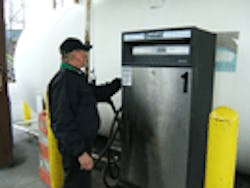Though diesel fuel prices in the U.S. took a welcome nosedive over the past two weeks, dropping an average of over 10 cents per gallon between Aug. 1 and Aug. 15 – experts not only believe the decline will be short-lived, but it will also be muted given the broader economic uncertainty now occurring.
“It’s a positive for trucking that diesel fuel prices are now falling, but a lot of the benefit is getting washed out because of all the economic volatility at the moment – and broad volatility is not good,” Jonathan Starks, director of transportation analysis for research firm FTR Associates, told Fleet Owner.
So unless there is an extreme run up or decline in oil prices, which would create extreme swings in diesel fuel costs, Starks believes the trucking industry won’t see much impact from the current drop in pump prices.
(For a look at where future energy sources may come from, click here.)
According to the latest figures from the Energy Information Administration (EIA), the U.S. average price for on-highway diesel fuel dropped to a little over $3.83/gal. this week from just north of $3.89/gal. last week. That’s also down from the average U.S. price of $3.93/gal. at the start of August, EIA noted.
Tom Kloza, chief oil analyst for the Oil Price Information Service (OPIS) told Fleet Owner that, based on recent wholesale prices, diesel fuel prices for many U.S. states could end up hovering between $3.65 and $3.90/gal. near term. Longer term, however, Kloza expects prices to increase again.
“Longer term, this will be the product that should reflect any strength in the global economy,” he stressed. “I wouldn’t be surprised to see 2012 prices, for example, be above $4/gal., if there is not a recession.”
EIA also expects diesel fuel prices to start increasing again as well, based on its projections for higher oil costs. The agency said the U.S. average refiner acquisition cost of crude oil should rise from $100 per barrel in 2011 to $107 per barrel in 2012 as global spare production capacity and inventories continue to decline.
EIA stresses that its forecast assumes that U.S. real gross domestic product (GDP) grows by 2.4% this year and 2.6% next year, while world oil-consumption-weighted real GDP grows by 3.4% and 4.1%t in 2011 and 2012, respectively.
“These assumptions do not fully reflect recent economic and financial developments that point towards a weaker economic outlook and also contributed to a sharp drop in world crude oil prices during the first week of August,” the agency noted in its most recent Short Term Energy Outlook.
The International Energy Agency (IEA) added that making long-term predictions for oil prices based on current conditions is proving far too tricky.
“There is a significant downside risk for oil prices if economic and financial market concerns become more widespread or take hold,” IEA noted in its Oil Market Outlook published last week. “Crude oil prices have plunged for the third time in three months, flirting with lows near $100 down to $80 per barrel, reviving all the old clichés about roller-coaster volatility.”
The agency expects that by September, the oil market’s direction may be clearer if the economic outlook itself has become more clear-cut. “Then again, August has a habit of springing both geopolitical and meteorological surprises, so the ‘big dipper ride’ may still have further to run,” it said.
About the Author
Sean Kilcarr
Editor in Chief
Sean Kilcarr is a former longtime FleetOwner senior editor who wrote for the publication from 2000 to 2018. He served as editor-in-chief from 2017 to 2018.
